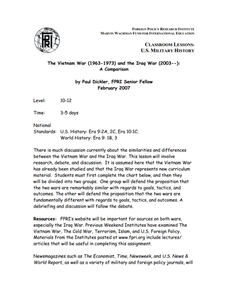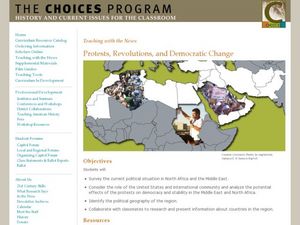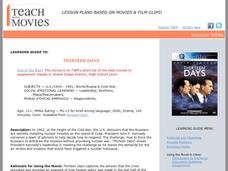Constitutional Rights Foundation
Arizona v. United States — States and Immigration Law
As part of a study of immigration law, class members read a summary of the Supreme Court case, Arizona v. United States. They then examine a series of examples and acting as federal court judges, must determine if the scenarios meet the...
Constitutional Rights Foundation
Driver’s Licenses And Unauthorized Immigrants
Should driver's licenses be granted to unauthorized immigrants? That is the question class members grapple with in a lesson that asks them to first read a fact sheet that details the arguments for and against licensing unauthorized...
Pulitzer Center
The Global Water Crisis
High schoolers examine the "quiet crisis," the lack of clean water, by reading articles and viewing video clips. They discuss the situations in Ethiopia, Yemen, Kenya, and Nepal. There are two options for the instructional activity, but...
Curated OER
Iraq: The Challenge of Securing the Peace
Students, in groups, are assigned a policy option. One of the other groups assumes the role of the President and his advisors or of the Senate Foreign Relations Committee.
Foreign Policy Research Institute
The Vietnam War (1963-1973) and the Iraq War (2003---): A Comparison
If you are planning a unit on military history that includes a comparison between the Vietnam War and the Iraq War, this resource may be useful. It lists possible sources for pupils to use to complete the graphic organizer which prepares...
Curated OER
Protests, Revolutions, and Democratic Change
Students examine uprisings in the Middle East and North Africa. In this global issues lesson, students view video clips, conduct group research, and present their findings in group presentations about the unrest in Algeria, Bahrain,...
Humanities Texas
Primary Source Worksheet: Theodore Roosevelt, Excerpt from Inaugural Address
"Much has been given us, and much will rightfully be expected from us." As part of a series of worksheets that provide readers with an opportunity to develop their primary source comprehension skills, kids examine an excerpt from...
Curated OER
To Join or not to Join the League of Nations - That is the Question
Students evaluate the possible reasons the United States did not become part of the League of Nations. In this World History lesson, students discuss the pros and cons of what might have happened if the United States had joined the...
Curated OER
The failure of Diplomacy, September-December 1941
Students investigate four main issues of concern between US and Japan prior to US involvement in World War II. In this role play lesson, students will take the role of US and Japanese negotiators trying to find a diplomatic solution to...
Humanities Texas
A President's Vision: Theodore Roosevelt
Through an engaging, interactive experience analyzing primary sources, invite your young historians to take a closer look at the presidency of Theodore Roosevelt.
Curated OER
Consequences of the Sedition Act
Students research and discuss the consequences of the Sedition Act. They illustrate the difficulty of balancing security needs and personal freedom using an example from John Adams's presidency.
Curated OER
California's Golden History: 1848-1880
Using a variety of online resources, learners study life and society in California during the gold rush. They use a map to identify area where gold was located, explore pre-selected websites, describe mining practices, and create an...
Curated OER
Undercover in the Secret State
Students examine the current conditions in North Korea. They view and analyze a CNN documentary, research a dissident, answer and discuss questions about the documentary on conditions in North Korea, and identify the technology used by...
Curated OER
Imposing Democracy
Twelfth graders discuss the probability of imposing a democracy in a country in which there is no history of this type of government being successful. Using the internet, they work together to research Japan's experience with democracy...
Curated OER
Sources of the Cold War
Fourth graders make a time line from their notes and outlines of the causes of the Cold War.
Curated OER
refugees From Vietnam and Cambodia
Tenth graders explore the massive immigration from Vietnam and Cambodia. In this World History instructional activity, 10th graders examine the crisis that led to this immigration. Students participate in a debate on whether the United...
Curated OER
The Crisis in Darfur
Students examine the history and current humanitarian crisis occurring in the Darfur region of Sudan. In small groups, they conduct Internet research, answer discussion questions, and present their findings to the class.
iCivics
A Very Big Branch
Through detailed secondary source reading material and an interactive "true/false" activity, learners discover the depth and complexity of the executive branch in the United States government. Topics covered include executive...
Curated OER
9/11: The Flight That Fought Back
Who is the al Qaeda and what happened on September 11? Older students will explore the political objectives of al Qaeda and possible reasons for the September 11 terrorist attacks by watching a video program and working through evidence...
Curated OER
American Becomes a Colonial Power
Exploring the idea of America joining "the imperialist club" at the end of the 19th century, this presentation presents reasons why America not only had the drive to explore the world, but the power and wealth with which to do so....
Curated OER
"The Missiles of October": The Cuban Missile Crisis, 1962
High schoolers investigate the presence of Soviet missiles in Cuba in 1962 and how that presence triggered an international crisis. The options available to the president as well as the advantages and disadvantages of each are...
Teach with Movies
Learning Guide to Thirteen Days
While Thirteen Days is a fantastic film to use in the classroom in reference to the Cold War and the Cuban missile crisis, it is important to take care to effectively and properly incorporate its contents into your curriculum. This...
Curated OER
President Madison's 1812 War Message: Answers Lead to More Questions
Learners investigate President Madison's case for declaring war against Great Britain. Students assume the roles of newspaper reporters and cite key points in Madison's argument for declaring war, and hypothesize about primary documents...
Curated OER
President Madison's 1812 War Message: A Brief Overview
Students investigate President Madison's War Message. Students read the message and discuss any information they may have misunderstood. Students hypothesize about what kinds of documents might help them find answers to their questions.
Other popular searches
- U.s. Foreign Policy Goals
- U.s. Foreign Policy 1989
- U.s. Foreign Policy Aid
- U.s. Foreign Policy Intro
- U.s. Foreign Policy 1945 60

























